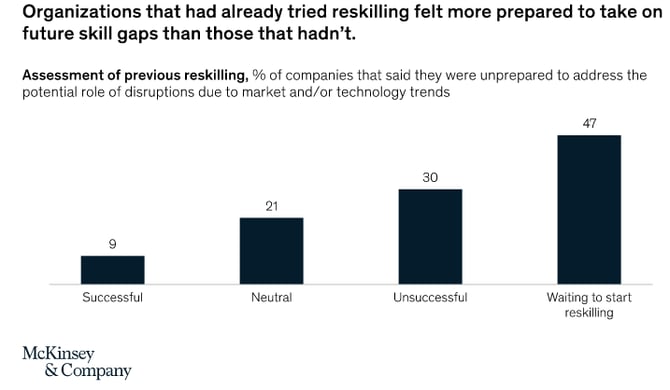Authored by: Ankurnath Berry, Vice President – HR
Introduction:
The article focuses on the importance of employee up-skilling and organizational development in remote working environments. It also talks about easy strategies that leaders should adopt to prioritize employee skill development in such remote working scenarios.
Objectives Importance of development: In a fast changing business scenario, there is a need for businesses to adapt quickly, and this includes remote solutions for clients and customers. There is a need to re-think the way day-to-day work is executed so that it can meet evolved client needs, many of which have accelerated due to the pandemic.
The transition from instructor-led classroom learning to online self-paced module-based experiential learning with limited instructor-led intervention is happening rapidly. With Work from Anywhere (WFA) becoming the new normal, the focus of learning has changed to bite-sized, mobile-enabled training.
Current Scenario driving the new normal: The pandemic has forced us to transform our work patterns in an extremely short span of time. To meet this urgency and to avoid any major impact on the way business is usually carried out, there is a need to re-think and up-skill employees working in remote environments. There is a major shift in the modes of employee training from instructor-led to self-paced, even mobile enabled training. According to a report by McKinsey “getting started on reskilling programs makes organizations better prepared for potential future role disruption—and is preferable to waiting”.

Source: McKinsey
Here are some more insights on the importance of upskilling that may be relevant, for comparison separated as pre-pandemic and post:
Pre-Pandemic: “62% of executives believe they will need to retrain or replace more than a quarter of their workforce between now (2018) and 2023 due to advancing automation and digitization. The threat looms larger in the United States and Europe (64% and 70% respectively) than in the rest of the world (only 55 %)—and it is felt especially acutely amongst the biggest companies - 70% of executives at companies with more than $500 million in annual revenues see technological disruption over the next five years affecting more than a quarter of their workers.”
Source: McKinsey
Post-Pandemic: In a Gartner survey of 113 learning and development leaders, 71% said that more than 40% of their workforce has needed new skills due to changes to work brought on by COVID-19. A World Economic Forum “Future Jobs Report 2020’’ found that companies estimate around 40% of their employees will need to be reskilled in half a year or less, and 94% of enterprise leaders believe employees will pick up these new skills on the job, a sharp uptake from 65% in 2018. Source: Forbes
Effective leadership methods & steps to prioritize up-skilling of employees: Today the main challenge for leadership is how to effectively prioritize learning and development of employees in a remote working environment and reskill /upskill their employees to deliver new business models successfully. To meet the challenges of employee up-skilling and smooth remote business operations, leaders should devise a strategy that includes development of employees’ social skills, emotional skills, digital capabilities, and cognitive capabilities which checks their adaptability and resilience. The leaders should ensure that the workforce is well equipped with the required skills vital to their recovery business models. It is time to invest in learning budgets and execute re-skilling to strengthen workforce and organizations for future disruptions.
Key Manger Roles:
- Understand the importance of learning and upskilling as it will have a direct impact on an individuals’ delivery and efficiency
- Allow time for development to reduce burnout and pressure on team members to manage & sustain their creativity and energy
- Allow team members to cope with stress and acquire new skills required to operate and be successful in a remote working environment
- Review each team members score card periodically
- Allow access and connect to learning opportunities and resources
- Encourage knowledge sharing and dedicate time for it
The Employment market is moving to a state where employees are differentiating between organizations that provide dedicated learning benefits and better time management options versus those who do not - leading to a talent exodus in favour of organizations that have a strong learning culture.
Challenges faced and mitigation plan: It is critical to invest in instructional design capabilities to have more and more bite-sized, self-paced interactive learning or subscribing to resources which provide the same. Alternatively personal training/ small group learning/ assignment and research-based learning would be helpful. Listed below are couple of challenges from a leadership and employee perspective:
| # |
Challenge faced |
Mitigation Plan |
| 1 |
Speed with which employees need to adapt to the new working norms. . |
Leverage collaboration tools get used to virtual video calls and learn new technologies rapidly. Accept the new normal and adopt the new norms, learn new technologies quickly, up-skill as soon as possible for smooth functioning and overall progress. |
| 2 |
Coping with work and up-skilling employees simultaneously - impact on day-to-day operations, slower work progress, employees investing a lot of time to up-skill, organizations need to invest in learning & development, training plans. |
Plan and manage the learning & development effectively, prioritize up-skilling; find alternatives to keep routine work at the normal pace. |
Conclusion:
To emerge stronger in the changing environment and to continue with business while accepting the ‘new normal’, organizations must update the methods of carrying out business with clients and at the same time up-skill their workforce to meet all the expectations. Up-skilling is the key to thriving. It is wise to invest in learning budgets and execute re-skilling to strengthen workforce and organizations and be ‘future proofed’ against upcoming disruptions.